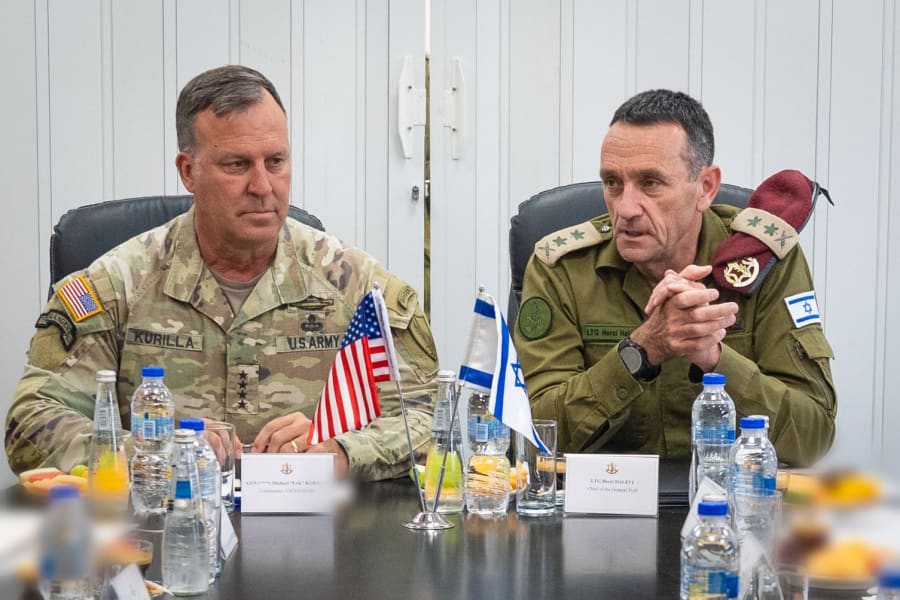IDF Chief Halevi and Arab counterparts discuss regional security in Bahrain

The ongoing conflict in Gaza between Israel and the terrorist organization Hamas has led to increased diplomatic tensions with Arab states. Despite this, security cooperation between Arab countries and Israel continues.
Israel's Walla News and Axios media reported that Israeli military Chief of Staff Lt.-Gen. Herzi Halevi met with generals from Jordan, the United Arab Emirates, Egypt, and Saudi Arabia in Bahrain last week to discuss regional security cooperation.
The multinational military summit was reportedly held under the auspices of the U.S. Central Command commander, Gen. Erik Kurilla. Due to heightened anti-Israel sentiments and anger across much of the Arab world following the war in Gaza, the organizers opted to keep the meeting low-profile.
Despite political differences, much of the Sunni Arab world and Israel continue to view the Iranian regime and its terrorist proxies Hamas, Hezbollah and the Houthis as a threat to the region’s stability. Regional Arab Israeli cooperation increased dramatically following the historic signing of the U.S.-brokered Abraham Accords in 2020, when the UAE, Bahrain, Sudan and Morocco normalized diplomatic ties with Israel.
In November 2021, the navies of the UAE, the United States, Israel and Bahrain held their first joint naval exercise in the Red Sea in what was perceived as a united front against the Iranian regime. American and Israeli naval forces have held previous joint drills, but this was the first time that Bahraini and Emirati naval forces were formally included.
At the time, a senior IDF officer described the significant regional threat posed by the Iranian regime.
“This [Iranian] presence is something that we need to push back as much as possible from the State of Israel, from the Red Sea, from the areas that harm our freedom to sail… In order to do that, we need to make our partnerships tighter,” the IDF officer stated.
Military cooperation between Israel and specific Arab states includes aerial power. In October 2021, Ibrahim Nasser Muhammed al-Alawi, head of the UAE Air Force, made a historic visit to Israel, marking the first time the head of the Emirati Air Force officially visited the country. He was hosted by former Israeli Air Force (IAF) Chief Amikam Norkin.
“I thank you, commander of the Emirati Air Force, for your willingness to come to Israel. This is a historic and important day for cooperation between the air forces,” the former IAF chief stated.
In April, when Iran launched an unprecedented aerial attack against Israel, several Arab states, including Jordan, Saudi Arabia and the UAE, joined a U.S.-led international coalition to assist Israel in neutralizing more than 300 incoming aerial threats. Some helped with military defense while others provided intelligence.
At the time, Jordanian Information Minister Samih al-Maaytah noted that Jordan was acting to protect itself.
“Jordan’s duty is to protect its lands and citizens,” al-Maaytah said. “What Jordan did yesterday was to simply protect its airspace,” he added, without mentioning Israel.
Saudi Arabia currently does not have official diplomatic ties with Israel, although some believe a Saudi-Israeli normalization deal may be possible if the U.S. and Saudi Arabia sign the security agreement that is in the works. In the meantime, the Saudi Kingdom has publicly criticized Israeli military operations against Hamas in Gaza and has joined the call for a two-state solution, which Israel continues to reject.
An unnamed Saudi official blamed Iran for engineering the war in Gaza to undermine relations between the Arab world and Israel.
“The Iranians engineered the war in Gaza in order to destroy progress in relations between us and Israel,” the Saudi official said.
“Iran’s behavior is irresponsible. We all know that Iran is a state sponsor of terrorism and it should have been stopped long ago.”

The All Israel News Staff is a team of journalists in Israel.
You might also like to read this:














